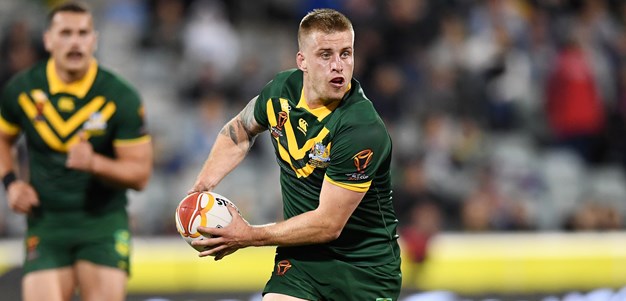
Each week former Queensland State of Origin strike weapon Chris Walker writes exclusively for QRL.com.au.
I remember receiving a phone call about Cameron Munster six years ago.
“I’ve just seen a superstar. He’s 17 and he’s a complete freak,” were the words that came down the line.
Watching Munster rip apart NRL teams in recent times has certainly been a pleasure, but I’ve enjoyed following him for the entirety of the past six years since receiving the hot tip.
He’s got an unnatural and awkward strength.
I don’t know if he’s overly strong in the gym, but in game situations he is incredible.
His ability to break tackles and contort his body to his advantage reminds me of a young Greg Inglis.
It just comes natural to him and, if you watch him, he manages to find his elbows and knees a heck of a lot more times than opponents can nail him on his back.
Even when he gets caught in the ruck and the gaps in the defensive line are smaller, he has a knack of twisting the mass of bodies to his advantage.
The other thing I really like about him is he plays what he sees in front of him.
Further to that, he’s not afraid to back himself and have a crack when he spots something.
A lot of players now come through such structured coaching in junior systems that they are afraid to gamble on themselves when the game is ready to be broken open.
If your club has a culture where people get berated for mistakes and get flogged at training for deviating from the gameplan, it’s only natural players second guess themselves when split decisions need to be made.
Often that nanosecond of doubt will be enough for the defence to shut you down, even if it means them getting a fingertip to a critical pass or to a chip-and-chase that otherwise would have worked.
As you may have gathered, I’m not a risk-averse individual.
I remember Wayne Bennett telling me early in my career: “If you’re going to attempt a big play, then commit yourself 100 per cent to it. Do not second guess yourself.”
There’s a massive culture in rugby league of being humble and unselfish, and sure, that’s a nice mantra and life lesson for young people to learn.
But have no doubt that many of the greatest rugby league players – or greatest athletes full-stop – have been extremely selfish individuals.
And I don’t say that in a derogatory way.
There’s a single-mindedness that gives people the time and desire to train harder than others, compete when others are content to participate, and strive continually towards betterment.
Elite league players need to be selfish in their preparation – avoiding social gatherings, being fussy about what they eat, prioritising the game over work commitments.
That same selfishness needs to pop up occasionally during gametime too.
An unconventional, unexpected play is usually 100 per cent selfish.
It’s a great contradiction that, in a team sport, sometimes it takes a selfish individual to secure victory.
I’ll even go as far to flip the whole perception on the head and say that teammates who do not like selfish players are in fact displaying their own form of selfishness.
Each player wants the glory and elation that comes with the win, and in order for a team to win, somebody must seize the opportunity.
Whether it’s through shifting the ball through 12 sets of hands, or it means an individual backing themselves in a narrow corridor to beat six players, there are risks inherent in both.
In this day and age, where players are so heavily scrutinised away from the field and the amount of fun you can have is diminished, I think it’s vital we encourage players to have fun in the actual game.
If that becomes their one avenue of release, I think it’s an awful shame to lock them up and give them a strictly rigid role.
People have become obsessed with the Cooper Cronk methodical style of play because he has been so successful.
But let’s not forget that this is how Cooper likes to play. It suits him and works to his strengths as an athlete and a person.
It’s not going to work for every person that has designs as a playmaker, whether that be at NRL level or junior footy.
Coaches like Craig Bellamy are so great because they recognise this.
I think he’s already adjusted his tactics around what allows Cameron Munster and Brodie Croft to be themselves and be their best.
I just hope coaches who teach our talented youngsters in their formative years also recognise the value in letting players express themselves as individuals.





